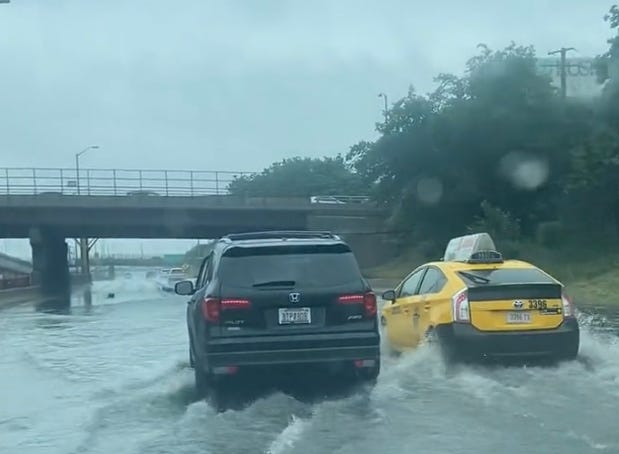
CHICAGO (WBBM NEWSRADIO) — Sunday’s record-setting rainfall in Chicago caused highway flooding, stopped some Chicago Transit Authority services and damaged many homes across Chicagoland, according to the National Weather Service (NWS).
O'Hare Airport reported 3.35 inches of rain, which surpassed Chicago's previous July 2 record rainfall of 2.06 inches. In suburban Berwyn, residents were hit with over 8 inches of rain while nearly 8 inches fell in Chicago’s Lincoln Park neighborhood.
The NWS described the storms as “potentially life-threatening.” At one point on Sunday, ComEd reported that more than 7,000 people were without power.
It was brought on by a slow-moving low pressure system combined with large amounts of atmospheric moisture.
The worst of the flooding took place on the Southwest Side of Chicago, as well as in the near west and southwest suburbs, NWS officials said.
In the city, the Metropolitan Water Reclamation District (MWRD) took the rare step of reversing the flow of Chicago's waterways in order to minimize flooding from the Chicago River. The reversal happened at two points: the Wilmette Pumping Station at Wilmette Harbor and the lock at the Chicago River.
Ed Staudacher, the assistant director of maintenance and operations at the MWRD, described the procedure as a “last resort.” The MWRD last reversed the flow of local waterways three years ago.
Sunday’s rains also impacted the NASCAR Grant Park 220 street race, which began about 90 minutes later than its original start time due to flood warnings.
Chicago’s Office of Emergency Management and Communications “has all available flood mitigation equipment on the streets and is prioritizing assistance to areas where motorists are stuck in flooded viaducts,” the city said in a statement.
“We urge motorists to use caution and avoid driving through standing water on streets, viaducts and low-lying areas. Residents can call 3-1-1, visit 311.chicago.org or use the CHI311 app to report water in your basement, standing water in the street or viaduct flooding,” the agency said.
The MWRD and OEMC advised residents to delay baths and showers, flush toilets less frequently and to wait before running a dishwasher or washing machine to prevent overtaxing the sewer system. Heavy rains combined with typical daily water flow can overwhelm the system and can cause more flooding.
(The Sun-Times Media Wire contributed to this report.)
Listen to our new podcast Looped In: Chicago
Listen to WBBM Newsradio now on Audacy!


